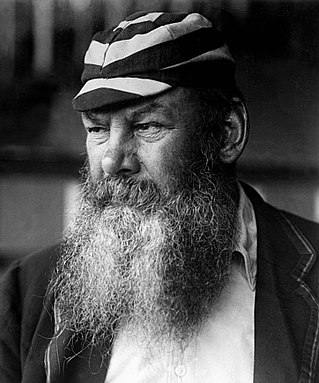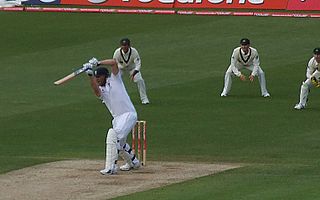
William Gilbert Grace was an English amateur cricketer who was important in the development of the sport and is widely considered one of its greatest players. He was nominally amateur as a cricketer, but he is said to have made more money from his cricketing activities than any professional cricketer. He was an extremely competitive player and, although he was one of the most famous men in England, he was also one of the most controversial on account of his gamesmanship and moneymaking.

An all-rounder is a cricketer who regularly performs well at both batting and bowling. Although all bowlers must bat and quite a handful of batsmen do bowl occasionally, most players are skilled in only one of the two disciplines and are considered specialists. Some wicket-keepers have the skills of a specialist batter and have been referred to as all-rounders, but the term wicket-keeper-batter is more commonly applied to them, even if they are substitute wicket keepers who also bowl.

William Lambert was an English professional cricketer who played for numerous teams between 1801 and 1817. He was born at Burstow in Surrey, and died at Nutfield, Surrey. A right-handed batting all-rounder, he is widely recognised as one of the greatest batters of cricket's underarm era. Using an underarm action, he bowled pitched deliveries at a slow pace. He generally fielded in close catching positions, mostly at slip and often played as wicket-keeper.
1869 was the 83rd season of cricket in England since the foundation of Marylebone Cricket Club (MCC). The Cambridgeshire club went into demise, though a team called Cambridgeshire later played in two specially arranged matches, in 1869 against Yorkshire and in 1871 against Surrey. After that, Cambridgeshire ceased to be a first-class team. The problem was attributed to the lack of available amateurs to back up the famous trio of Bob Carpenter, the first Tom Hayward and George Tarrant, along with the absence of useful patronage and the difficulty of obtaining membership which led to a debt deemed unpayable.
1876 was the 90th season of cricket in England since the foundation of Marylebone Cricket Club (MCC). Gloucestershire reclaimed the unofficial "Champion County" title. A relatively dry summer and improvements to pitches via the heavy roller saw several batting records broken.
1887 was the 101st season of cricket in England since the foundation of Marylebone Cricket Club (MCC). Surrey was the leading county for the first time in over twenty years, a status they would retain until 1892.
Variations in published cricket statistics have come about because there is no official view of the status of cricket matches played in Great Britain prior to 1895 or in the rest of the world prior to 1947. As a result, historians and statisticians have compiled differing lists of matches that they recognise as (unofficially) first-class. The problem is significant where it touches on some of the sport's first-class records, especially in regards to the playing career of W. G. Grace.
James Coupe "Jem" Shaw was an English professional cricketer who played for Nottinghamshire from 1865 to 1875 making 115 appearances. According to WG Grace, few bowlers had a better record.
W. G. Grace is believed to have considered retirement from cricket before the 1878 season after he was seriously injured in a shooting accident the previous autumn which nearly cost him the sight of an eye. Having recovered, he reconsidered and in 1878 played in 33 matches, 24 of which are generally recognised as first-class. His main roles in the season were captain of Gloucestershire County Cricket Club and both match organiser and captain of the United South of England Eleven (USEE). In addition, he represented Marylebone Cricket Club (MCC), the Gentlemen in the Gentlemen v Players fixture and the South in the North v South series. 1878 was a cold, wet summer and not one of Grace's better seasons as a batsman, but he was very effective in such conditions as a right arm medium pace roundarm bowler and completed a sixth successive "double" by scoring 1,151 runs and taking 152 wickets in the recognised first-class matches.
W. G. Grace established his reputation in 1864 and, by 1870, was widely recognised as the outstanding player in English cricket.
W. G. Grace played in 31 matches in the 1895 English cricket season, 29 of which are recognised as first-class.
Following his "Indian Summer" in 1895, W.G. Grace continued to play first-class cricket through his fiftieth birthday in 1898 and finally severed his connections with both Gloucestershire and England in 1899.
W.G. Grace was mainly associated with the new London County Cricket Club during this period. His first-class career ended in 1908 when he was nearly 60.
Following his father's death in December 1871, W. G. Grace increased his involvement with the United South of England Eleven (USEE) in order to provide more income for his mother, with whom he and his younger brother Fred were still living. Grace continued to play regularly for Gloucestershire and Marylebone Cricket Club (MCC) and, when required, by the Gentlemen. In the late summer of 1872, he toured North America with a team of players who all had amateur status. In the 1873 season, he performed his first season "double" of 1,000 runs and 100 wickets.

One of the most outstanding phases of W. G. Grace’s career occurred in the 1876 season, beginning with his career highest score of 344 for MCC v Kent at Canterbury in August. Two days after his innings at Canterbury, he made 177 for Gloucestershire v Nottinghamshire; and two days after that 318 not out for Gloucestershire v Yorkshire, these two innings against counties with exceptionally strong bowling attacks including Alfred Shaw, Fred Morley, Tom Emmett and Allen Hill. Thus, in three consecutive innings Grace scored 839 runs and was only out twice.
W. G. Grace qualified as a doctor in 1879 made his first appearance in Test cricket the following year, scoring the first-ever century by an England batsman.
W. G. Grace played mostly for Gloucestershire County Cricket Club and Marylebone Cricket Club (MCC) during the four seasons from 1883 to 1886. He also represented England and shared his highest Test partnership in 1886, the same season in which he achieved his career-best bowling analysis.
W. G. Grace played mostly for Gloucestershire County Cricket Club and Marylebone Cricket Club (MCC) during the five seasons from 1887 to 1891. He also represented England in Test cricket.
W. G. Grace played mostly for Gloucestershire County Cricket Club and Marylebone Cricket Club (MCC) during the five seasons from 1887 to 1891. He also represented England in Test cricket.
W. G. Grace visited Australia in 1873–74 as captain of Lord Sheffield's team.




